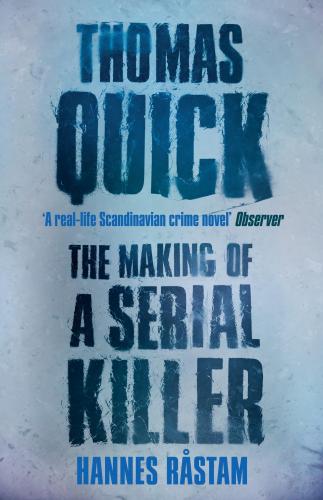The Trial in Gällivare District Court
The Quick Commission Breaks Down
Chronology of Sture Bergwall/Thomas Quick
FOREWORD BY ELIZABETH DAY
Many of you will find it hard to believe the story you are about to read.
I first came across the extraordinary tale of Thomas Quick, the serial killer who never was, when I read a brief news article in August 2012 about a book that had just been published in Sweden. The book, which went on to be a bestseller, was written by investigative journalist Hannes Råstam and exposed one of the country’s biggest miscarriages of justice in recent times. It told the story of how a patient incarcerated in a psychiatric hospital had confessed to more than thirty murders he never committed.
The man was called Thomas Quick. He was once believed to be Sweden’s most notorious serial killer. Throughout the 1990s, his bespectacled face stared out from front pages and television screens. The newspapers even gave him his own nickname – ‘The Cannibal’.
On the strength of his confessions, Quick was convicted of eight murders. But when Råstam started investigating the case in 2008, he discovered that there was not a shred of technical evidence that existed to back up the confessions. There were no DNA traces, no murder weapons and no eyewitnesses – nothing apart from Quick’s first-hand accounts, many of which were riddled with inaccuracies and had been given when he was under the influence of narcotic-strength drugs.
The book you now hold in your hands is testament to Råstam’s bloody-minded genius, to the fact that he asked questions and kept asking them, even when it became clear that the Quick scandal reached the highest echelons of Swedish society and even when there were plenty of people who wanted him to stop, who dismissed Råstam’s painstaking research as wild theorising and who didn’t want to admit that something, somewhere had gone so terribly wrong.
Because to admit that Råstam was right was to admit that an innocent man had been wrongfully incarcerated for years. It was to admit that there were murderers at loose who had never been brought to justice for their crimes. That the police, the lawyers and the therapists were all responsible for astonishing lapses of judgement, and an ensuing travesty of justice. And it was to admit that what happened in Sweden could conceivably happen again elsewhere, with equally devastating results.
Perhaps the most extraordinary part of this story is that Råstam was right.
When I read that small news item back in August 2012, it struck me that if I had been watching the tale of Thomas Quick unfold in an episode of a Scandinavian television drama, I would have felt the plot was too far-fetched. But there it was in black and white: this actually happened. I was intrigued. A cursory Internet search showed that Quick, now living under his birth name of Sture Bergwall, was still incarcerated in Säter – the same psychiatric hospital where he had made his ‘confessions’. He had been acquitted of five of the murders and was awaiting the outcome of two further retrials. I travelled to Sweden to meet him and wrote a piece about the case for the Observer.
I was aware, throughout my trip, that the feature I was writing would not have been possible without the sheer dedication of Hannes Råstam. He was a brilliant investigative journalist. In Sweden, where he started out as a professional bass player before making a career change and becoming a documentary researcher in his late thirties, Råstam had won a clutch of prestigious awards. He was renowned for his fearlessness in tackling big subjects – from exposing police cover-ups to tracking down sex-traffickers – and for his relentless pursuit of the truth.
At journalism school, his teachers said that if they sent a group of students to cover a car accident, everyone else would have returned to their desks and written the article while Hannes would still be at the scene, examining a wheel nut. The lawyer Thomas Olsson, who worked with Råstam on many of his stories and who now represents Sture Bergwall, says this attention to the tiniest element of an investigation was typical. ‘Hannes was devoted to what he believed was the journalistic mission, and, as a consequence of that, extremely careful with the details,’ Olsson says. ‘Every statement or detail was turned around several times and had to be confirmed before publishing. I once told him that if the court was as careful about the evidence as he was, there would be no risk whatsoever that anybody would ever be wrongfully convicted of a crime.’
He respected the facts. And
